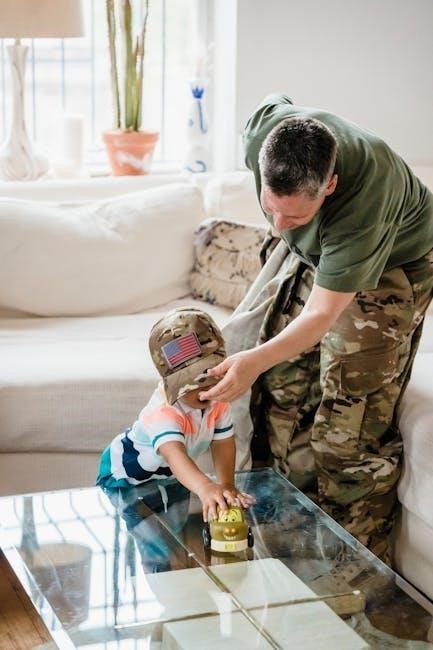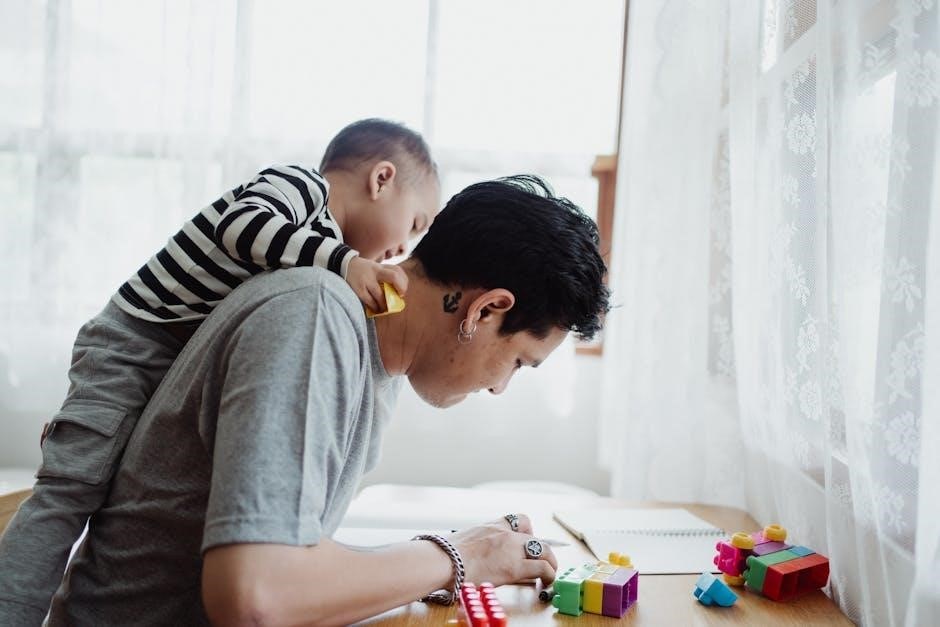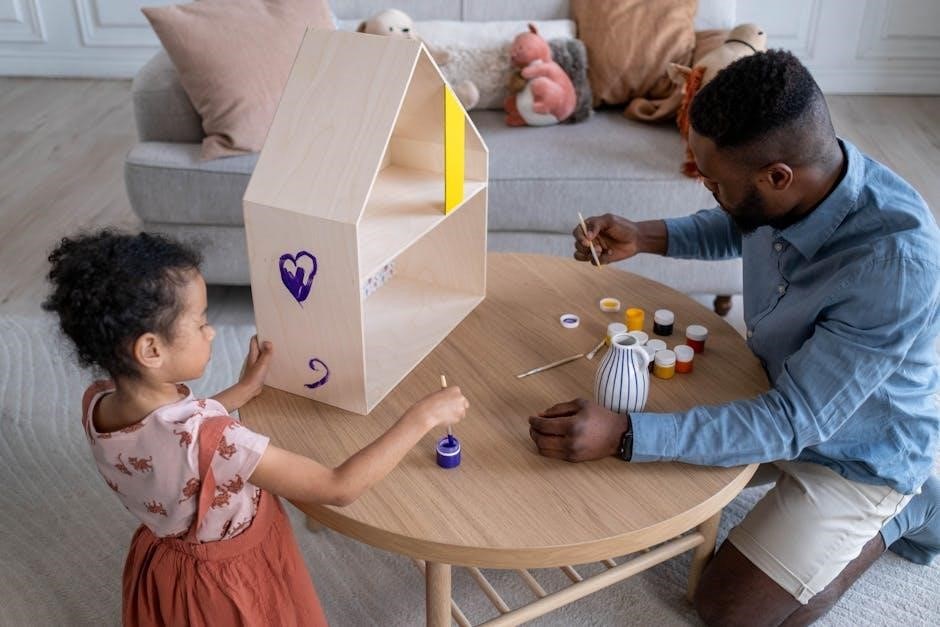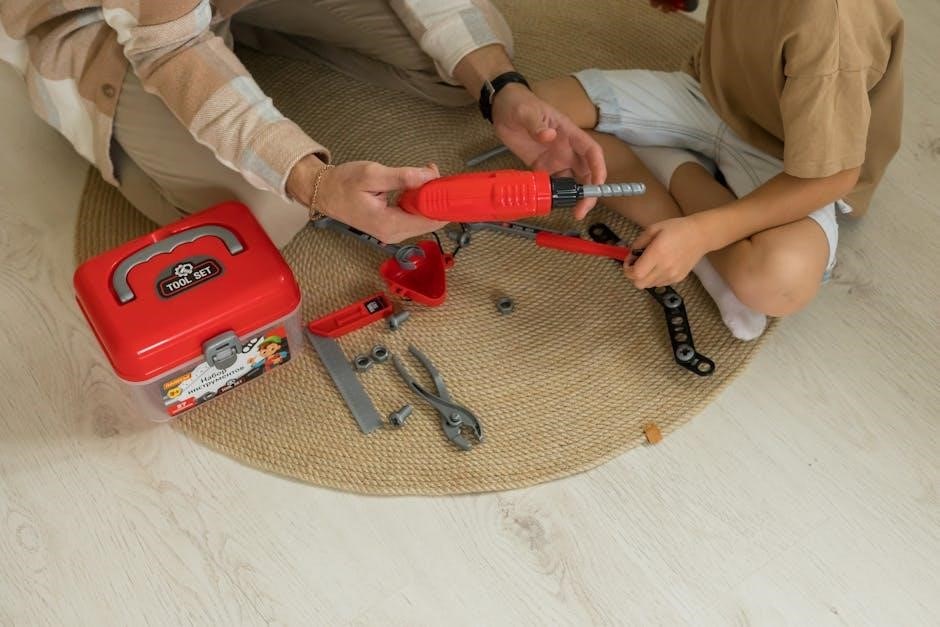Family roles in addiction refer to the patterns individuals adopt to cope with a loved one’s substance use. Common roles include the Enabler, Distancer, and Supporter. These roles aim to maintain stability but often perpetuate harmful dynamics, requiring intervention and understanding for recovery.
1.1. Understanding the Concept of Family Roles
Family roles in addiction emerge as coping mechanisms within households affected by substance use. Each member adopts distinct behaviors to maintain stability, often unconsciously perpetuating harmful dynamics. These roles, such as the Enabler or Distancer, are well-documented and categorized to aid understanding. Recognizing these patterns is crucial for addressing addiction’s impact and fostering recovery. By identifying and challenging these roles, families can begin to rebuild healthier relationships and dynamics.

1.2. The Impact of Addiction on Family Dynamics
Addiction profoundly disrupts family dynamics, leading to strained communication and the emergence of dysfunctional roles. Family members often adopt roles like the Enabler or Distancer to cope, unintentionally perpetuating unhealthy patterns. These roles, while intended to maintain stability, can exacerbate tension and prevent addressing the addiction directly. The ripple effects of addiction alter relationships, creating a cycle of dysfunction that requires intervention and understanding to break.
1.3. Importance of Addressing Family Roles in Recovery
Addressing family roles in recovery is crucial for breaking harmful patterns and fostering healing. By understanding and challenging these roles, families can eliminate enabling behaviors and promote healthy communication. This process encourages accountability for the addicted individual and supports the well-being of all members. Ignoring these dynamics can hinder recovery, while addressing them creates a foundation for trust, mutual support, and long-term healing.
Common Family Roles in Addiction
In addiction, families often adopt specific roles like the Enabler, Distancer, Supporter, Mascot, and Scapegoat. These roles shape dynamics, influencing recovery and relationships, and must be addressed for healing.
2.1. The Enabler
The Enabler unconsciously supports the addict’s behavior by covering up or providing resources that facilitate addiction. This role often stems from a desire to avoid conflict or protect the addict. Enablers may pay bills, lie for the addict, or consistently bail them out of trouble, which prevents the addict from facing consequences. While their actions are often well-intentioned, enabling behaviors can deepen dependency and delay recovery. The enabler may also struggle with setting healthy boundaries, feeling overly responsible for the addict’s well-being.
2.2. The Distancer
The Distancer copes with addiction by emotionally or physically withdrawing from the family. This role often emerges as a way to avoid conflict or the stress of dealing with the addict’s behavior. By creating distance, they may feel temporary relief but inadvertently allow the addiction to continue unchecked. This detachment can hinder recovery efforts and prevent open communication, further isolating the family and delaying necessary interventions or support for the addict.
2.3. The Supporter
The Supporter plays a crucial role by offering emotional encouragement and stability to the family. They often act as the caregiver, providing comfort and reassurance to both the addict and other family members. While their intentions are positive, they may unintentionally enable harmful behaviors by shielding the addict from consequences. Balancing support with healthy boundaries is essential to avoid perpetuating the addiction cycle while fostering an environment conducive to recovery and healing for all involved.
2.4. The Mascot
The Mascot often adopts the role of maintaining positivity within the family, using humor or optimism to distract from the tension caused by addiction. This role involves minimizing conflict and emotional pain, which can prevent the family from addressing the addiction directly. While their intent is to keep the family together, they may struggle with their own emotional burden, highlighting the need for their well-being to be considered in the recovery process.
2.5. The Scapegoat
The Scapegoat is often blamed for the family’s problems, diverting attention from the addiction. This role involves acting out or rebelling, which can lead to feelings of guilt or resentment. The Scapegoat may struggle with self-esteem and emotional turmoil, as they bear the brunt of the family’s frustration. This role can prevent the family from addressing the addiction directly, highlighting the need for healing and understanding in the recovery process.

The Role of Communication in Addiction
Communication plays a crucial role in addressing addiction, as it helps families express concerns, set boundaries, and foster understanding. Open dialogue can break the cycle of dysfunction and secrecy, enabling healing and recovery. Effective communication also strengthens trust and support systems, which are essential for overcoming addiction and rebuilding relationships within the family structure.
3.1. Strained Communication Patterns
Strained communication patterns often emerge in families dealing with addiction, leading to emotional distance and unspoken resentments. Family members may avoid discussing the addiction to prevent conflict, creating a toxic environment of secrecy. This avoidance can enable the addiction, as honest dialogue is suppressed. Over time, this cycle of miscommunication can distort relationships, making it harder to address the addiction openly. Breaking these patterns requires effort and willingness to engage in difficult but necessary conversations to support recovery and healing.
3.2. The Role of Secrecy and Denial

Secrecy and denial are common barriers in families dealing with addiction, often shielding the addict from accountability. Family members may hide the addiction to protect their loved one or avoid stigma. Denial prevents acknowledgment of the problem, delaying necessary intervention. This cycle perpetuates the addiction, fostering a culture of silence and enabling harmful behaviors. Breaking through denial and secrecy is crucial for initiating recovery and fostering honesty within the family structure.
3.3. Effective Communication Strategies
Effective communication is vital for addressing addiction within families. Active listening, empathy, and honesty create a safe space for open dialogue. Using “I” statements instead of “you” statements helps avoid blame and defensiveness. Setting clear boundaries and expressing feelings without judgment fosters understanding. Regular family meetings and seeking professional guidance can enhance communication. These strategies help rebuild trust and promote healing, encouraging collaboration in the recovery process.
Dysfunctional Family Roles
Dysfunctional family roles often perpetuate addiction by enabling harmful behaviors and preventing healthy communication. These roles can create a toxic environment that sustains addictive patterns and prevents recovery.
4.1. Emergence of Dysfunctional Roles
Dysfunctional family roles emerge as coping mechanisms in response to addiction. Family members often adopt roles like the enabler or scapegoat to manage stress and maintain balance; These roles, while initially adaptive, become harmful over time, reinforcing unhealthy patterns and enabling addictive behaviors. The emergence of these roles is often rooted in a lack of effective communication and unresolved emotional conflicts, creating a cycle that perpetuates dysfunction and prevents recovery.
4.2. Impact on Family Relationships
Dysfunctional family roles strain relationships, fostering resentment and emotional distance. Communication breaks down, leading to misunderstandings and trust issues. Family members may feel isolated or unsupported, contributing to a lack of intimacy. Increased conflict creates a stressful home environment, hindering recovery efforts. These dynamics can lead to long-term emotional and mental health challenges, complicating the healing process for both the addict and the family.
4.3. Breaking the Cycle of Dysfunction
Breaking the cycle of dysfunction requires professional guidance and a commitment to change. Families must acknowledge harmful patterns and work to redefine roles. Open communication, boundary-setting, and accountability are essential. Encouraging self-care and personal growth helps individuals break free from toxic dynamics. Therapy can provide tools to rebuild trust and foster healthier relationships, enabling families to move beyond addiction-related dysfunction and create a supportive environment for recovery and long-term healing.

The Role of the Family in Addiction Recovery
Families play a vital role in addiction recovery by offering emotional support, participating in therapy, and fostering a nurturing environment. Their involvement helps rebuild trust and relationships, empowering the individual to sustain long-term recovery and healing.
5.1. Supporting the Addicted Individual
Families play a key role in supporting recovery by creating a safe, non-judgmental environment. Encouraging treatment, active listening, and celebrating progress helps build confidence. Avoid enabling behaviors, instead fostering resilience and motivation. This constructive support empowers individuals to take responsibility for their recovery, reducing feelings of guilt or shame. By being present and understanding, families can help their loved ones stay committed to the healing process and rebuild their lives.
5.2. Participating in Family Therapy
Family therapy is essential for addressing addiction’s impact on relationships. It provides a structured environment for open dialogue, helping members understand their roles and behaviors. Through therapy, families learn healthy communication, set boundaries, and develop empathy. A trained therapist guides the process, fostering accountability and healing. Active participation fosters unity, helping the family system recover alongside the individual. This collaborative approach strengthens relationships and promotes long-term, sustainable recovery for all involved.
5.3. Rebuilding Trust and Relationships
Rebuilding trust and relationships in families affected by addiction requires effort and commitment from all members. Acknowledging past hurts and betrayals is crucial, alongside sincere apologies and amends. Setting clear boundaries helps prevent enabling behaviors. Open communication fosters understanding and empathy, while transparency rebuilds trust. Forgiveness is a process, and healing occurs gradually. Families must work together to create a supportive environment, addressing past wounds while focusing on mutual growth and recovery.

Professional Intervention and Family Roles
Professional intervention helps families understand their roles in addiction, providing guidance and strategies to support recovery and improve family dynamics. Experts offer tailored solutions and care.
6.1. The Role of Counselors and Therapists
Counselors and therapists play a crucial role in guiding families through the complexities of addiction. They help identify harmful patterns and provide strategies for healthy communication. Through individual and group therapy, they empower family members to support recovery while addressing their own emotional needs. They also educate families on recognizing enabling behaviors and promote a supportive environment. Their expertise aids in reconstructing positive family dynamics and fostering long-term healing for all involved.

6.2. Family Counseling Approaches
Family counseling approaches are tailored to address the unique challenges of addiction. These methods aim to foster a supportive environment, helping families identify and change harmful patterns. Techniques like Cognitive Behavioral Therapy (CBT) and Family Systems Therapy focus on improving communication and setting healthy boundaries. By addressing emotional dynamics and enabling behaviors, these approaches promote collaboration and lasting change, empowering families to support recovery effectively.
6.3. The Importance of Professional Guidance
Professional guidance is crucial in navigating the complex dynamics of addiction within families. Without it, families often struggle to address underlying issues, leading to prolonged conflict and enabling behaviors. Therapists provide tailored strategies to improve communication, set boundaries, and promote healthy interactions. Their expertise helps families move beyond dysfunction, fostering a supportive environment for recovery and long-term healing;
Cultural Perspectives on Family Roles
Cultural values shape family roles, influencing responses to addiction. Collectivist societies emphasize harmony, while individualist cultures focus on personal responsibility. Cultural stigma and healing practices impact recovery approaches.
7.1. Cultural Influences on Addiction and Family Roles
Cultural norms significantly influence how families perceive addiction and assign roles. In collectivist cultures, family honor and harmony may prioritize over individual struggles, while individualist cultures focus on personal accountability. Stigma surrounding addiction varies across cultures, impacting willingness to seek help. Traditional healing practices and community support systems also shape family responses, highlighting the need to consider cultural contexts when addressing addiction and role dynamics within families.
7.2. Addressing Addiction in Different Cultural Contexts

Addressing addiction across cultures requires cultural sensitivity and adaptability. Strategies must respect traditional values and beliefs while promoting recovery. Involving community leaders, spiritual figures, or elders can enhance trust and engagement. Therapeutic approaches should be tailored to cultural norms, ensuring they resonate with the family’s background. Open communication about addiction’s impact, combined with culturally relevant resources, fosters understanding and encourages families to seek help without fear of judgment or shame.
7.3. The Role of Community in Recovery
The community plays a vital role in supporting families and individuals recovering from addiction. Local support groups, cultural initiatives, and collective efforts create a network that fosters healing. Community-based programs often align with cultural values, making them more accessible and effective. Shared experiences and mutual understanding within the community reduce stigma and encourage open dialogue. This collective support system strengthens resilience and helps families rebuild their lives, promoting long-term recovery and well-being.

Resources for Understanding Family Roles
Explore books, online support groups, and workshops to gain insights into family roles in addiction. These resources offer practical strategies and expert guidance for healing and understanding.
8.1. Recommended Reading and Literature
Several books and eBooks explore family roles in addiction, offering deeper insights and practical advice. Titles like “The Family Recovery Guide” and “Addiction and the Family” provide comprehensive frameworks. Additionally, downloadable PDF resources from organizations like the National Institute on Drug Abuse (NIDA) and the Substance Abuse and Mental Health Services Administration (SAMHSA) offer evidence-based information. These materials are invaluable for understanding dynamics and fostering recovery.
8.2. Online Resources and Support Groups
Online resources and support groups provide accessible tools for understanding family roles in addiction. Websites like Alcoholics Anonymous (AA) and Narcotics Anonymous (NA) offer virtual meetings and guides. SMART Recovery and Family Therapy Associates provide structured programs. Online forums and communities, such as SupportGroupsCentral, connect families globally. Additionally, organizations like NIDA and SAMHSA offer downloadable PDF guides and webinars. These resources empower families with knowledge and strategies to navigate addiction dynamics effectively.
8.3. Workshops and Educational Programs
Workshops and educational programs on family roles in addiction provide structured learning experiences. These sessions often include lectures, group discussions, and practical exercises. Topics may cover communication strategies, boundary setting, and understanding enabling behaviors. Some programs target specific roles within the family, offering tailored guidance. Many workshops are available online, making them accessible to a wide audience. These programs aim to empower families with the knowledge and tools needed to support recovery effectively.
Understanding family roles in addiction is crucial for fostering a supportive environment. Addressing these dynamics promotes healing, encouraging positive change and fostering resilience within families.
9.1. Summary of Key Points
In addressing family roles in addiction, it is essential to recognize how roles like the enabler, supporter, and scapegoat impact dynamics. Addiction disrupts communication, fostering secrecy and denial, which hinder recovery. Effective strategies involve open dialogue and therapy. Families must break dysfunctional patterns and rebuild trust. Professional guidance is crucial for navigating these challenges. Ultimately, understanding and transforming family roles can create a supportive environment for healing and lasting change.
9.2. The Path Forward for Families

Families must adopt healthy communication and boundaries to support recovery. Encouraging open dialogue and seeking therapy can rebuild trust. Education about addiction and family roles empowers members to avoid enabling behaviors. Participating in support groups and leveraging professional guidance fosters resilience. By addressing dysfunction and promoting empathy, families can create a nurturing environment for healing. The journey requires patience, understanding, and collective effort to break harmful cycles and rebuild strong, supportive relationships.
9.3. Final Thoughts on Family Roles in Addiction
Family roles in addiction profoundly impact both the individual and the family system. Recognizing these roles is crucial for healing. Change often requires therapy or support groups to address enabling, distancing, or other harmful patterns. Recovery involves collective effort, fostering understanding and commitment. Families can rebuild relationships and find peace by seeking help and embracing change. The journey is challenging but rewarding, offering hope for a healthier, more supportive family dynamic.
